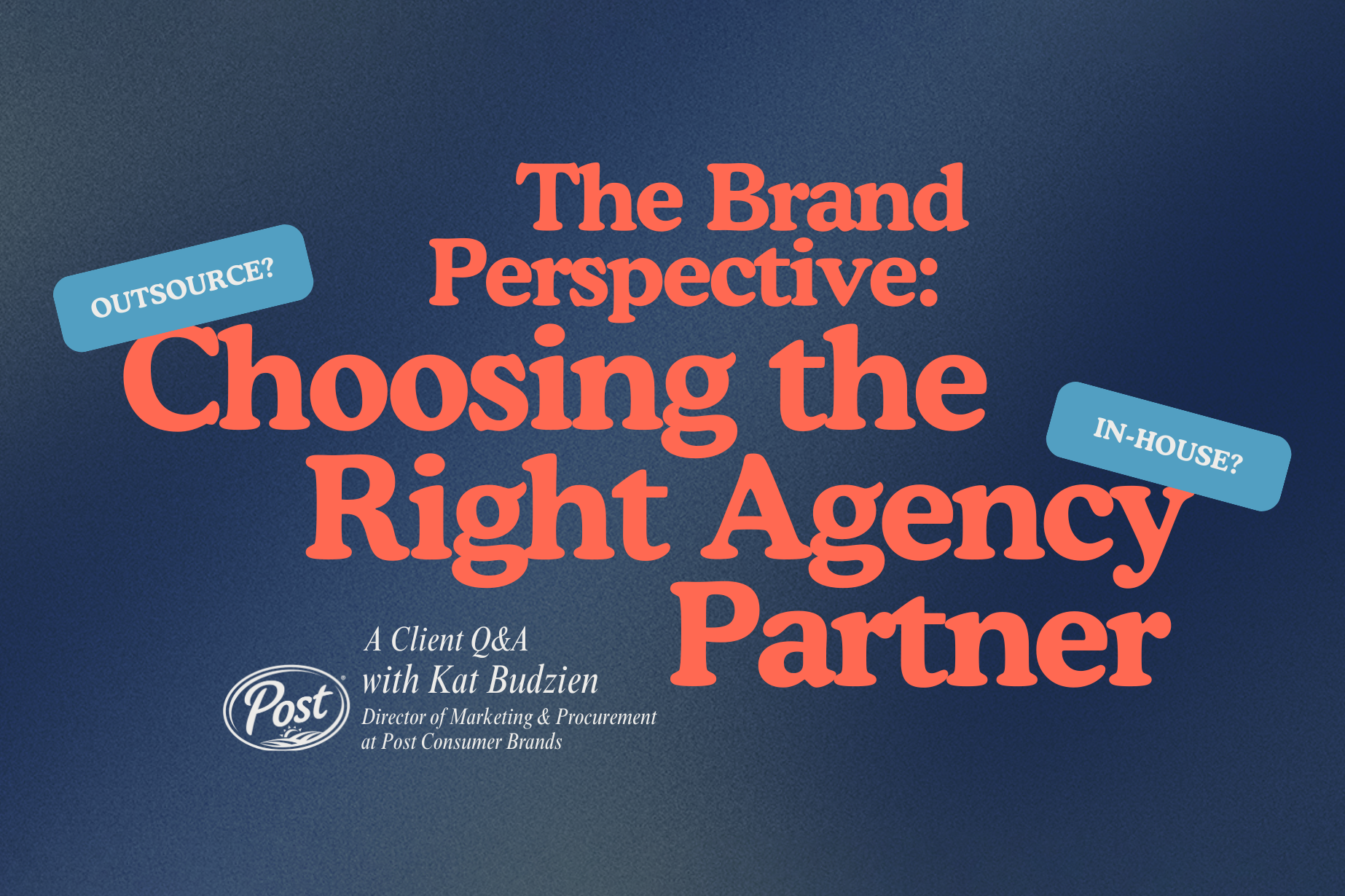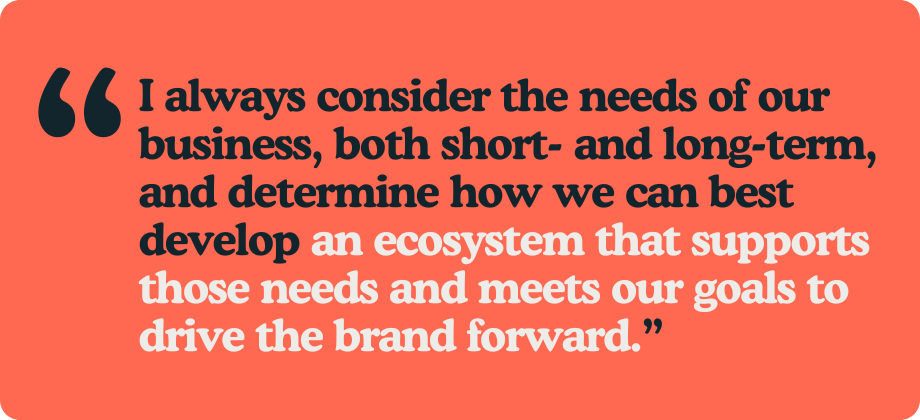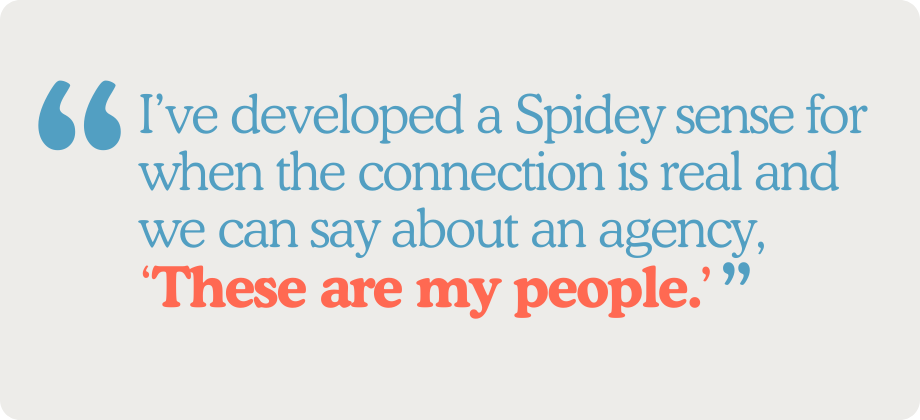


There’s been a lot of talk in industry press of late about that age-old question: Should I bring things in-house or stay with my agency? Where’s the best value? Ask any agency leader those questions and you’re going to hear about broad experience and skill sets that brands can’t hire for, but to get a definitive answer we turned the mic over to Latitude client Kat Budzien, Director of Marketing & Procurement at Post Holdings, Inc., the holding company of Post Consumer Brands, where Latitude signed an AOR partnership agreement earlier this year. Here’s what she had to say about the five real reasons to hire an agency.
KAT: Well, it has to be about the need first and foremost. I always consider the needs of our business, both short- and long-term, and determine how we can best develop an ecosystem that supports those needs and meets our goals to drive the brand forward. You must have a very clear vision for the expertise you need around the table and go from there. For a while, there was a trend to hire one-stop-shop holding company agencies, but from my experience, in the absence of a pretty massive budget and loads of brands, it’s a less successful model. I worked with a culinary expert who sums it up best. He was talking about restaurants that have large, extensive menus with all kinds of different dishes, and said, you can’t do it all well. The same is often true with one-stop shops.

Well, it’s long been a buzz concept. And it’s easy to stand on the outside and look at a brand and think they’re doing it well. When you hear marketers talk about building in-house agencies, the argument is often about savings. Don’t get me wrong. Massive brands can create slick in-house agencies. But it’s rare that wholesale in-house agencies work, for a few reasons. You need the in-house skills and capabilities to largely mimic what a specialty agency brings to the table as well as the ability to deliver thinking that’s on par with an external partner; to get out of the group-think and get exposure to the industry at large, and all of its good ideas AND bad ideas. You need to be able to deliver the same level of content and other services, and to truly realize savings, it’s crucial to eliminate most external costs and internally reinvest those funds appropriately. But in reality, that’s hard to manage. You’re going to have unproductive people who are paid an FTE salary but aren’t producing FTE results, and there’s a likelihood of reworking outputs that have to go to an external agency partner anyway. It’s a rare unicorn to see a brand with its own internal agencies that never use an external agency partner. The diversity of expertise around the table is a really crucial aspect of architecting an effective agency ecosystem, complete with the internal creative partner who has their specific and very important role to play.
I think there’s a general sense that agencies can’t ask questions. Some feel if they do, it means they don’t know everything. I don’t view questions as a negative thing. I learned early in my career that this often can be traced back to the desire to get things right. Clients can sometimes be ambiguous about expectations, especially when they change over time, so it’s a good idea for the agency to assume the responsibility to ask any and all questions and eliminate any kind of misunderstanding.
Simply put: Can the agency have real and honest conversations with you as the client? Can they communicate well, especially during times of real change like we have in the industry right now? Agencies should be able to have open, honest and ongoing communications with their clients like they would with their own business partners. Share with clients what’s keeping you up at night and when a client budget gets suddenly slashed, see if there’s a way to stay the course, even if in the short term it might mean a financial hit. Doing that establishes long-term commitment to working together through the hard stuff and strengthens the client-agency relationship in a meaningful way. There’s a lot of waste and expense in changing agencies regularly, so if we can make a long-term partnership work, it’s in everyone’s best interest.
Well, obviously, the ability to meet what’s in the brief. But that’s the easy part. I’m not interested in a flashy presentation or a tight pitch, but I am very focused on genuine connection. I need to see curiosity on both sides of the table and chemistry is extremely important. It’s why we have Q&A sessions and agency client dinners to find ways to connect. And an agency needs to demonstrate this connection over time, not just in the early stages of the relationship. It’s also about the agency having something uniquely theirs, a secret sauce if you will, that sets them apart. We’ve made decisions before based on chemistry in a pitch, but without an ongoing commitment to connection, the relationship will suffer. The client has some responsibility in managing this, and the agency needs to continue to show up and find new ways to connect. I’ve been around the block a few times, so I’ve developed a Spidey sense for when the connection is real, the heart and brains are genuinely there, and we can say about an agency, “These are my people.”

The quality that isn’t rare, per se, but is a huge contributor to an agency being considered “best in class” and achieves long-term status with a client is the flexibility to adapt to your client’s ever-changing needs. Anyone who has spent a week in the agency seat knows change is constant with brands. The agency rarely knows all the details of the changes that occur, but they do need to understand and embrace their role in the face of change: being flexible, empathetic and appropriately responsive to the client’s challenges.
I’ve observed agencies that do this really well—taking time to understand as much as possible about the changes, working collaboratively with the client in response to the changes, and being truly invested in working on solutions together. I’ve also observed agencies that fall down at the opportunity to respond to changes in a helpful, productive way—standing by the letter of the scope in a transactional and cold manner, void of any trust-building or relationship-strengthening collaboration to find solutions together.
Would we say to our spouse, “Sorry you got laid off, we didn’t really agree to me shouldering the load financially so you’re going to need to figure this out and come back to me when you have a job?” No, we’d link arms and acknowledge the problem, seek to understand what they’re feeling and what they need from us in that moment, and work together to address the challenge. Sure, our personal relationships are not exactly the same as our professional relationships, but the sensibility shouldn’t be much different.
If an agency is showing up with the scope in hand and a rate card to address the client’s problems in response to every challenge, this is a tell-tale sign that the partnership isn’t going to last. The agencies that approach their client/agency partnership in the same manner as any problems they’re faced with in life—with empathy, generosity, collaboration and an authentic problem-solving mindset—rise to the top of the client’s roster and remain there for the long haul. In good times and in bad (not a pun).